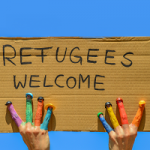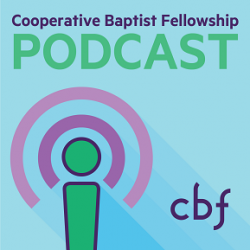Editor’s Note: Learn more about the ministry of CBF field personnel Marc and Kim Wyatt and read about CBF’s continued efforts to serve refugees in dozens of countries around the world: “CBF ministers to refugees and immigrants despite order banning travel to the U.S.”
By Marc Wyatt
I was recently asked about our ministry to newly-arrived refugees: “But what do you do when they don’t speak English?”
Good question.
Well, I do a lot of smiling and pointing with my hand not my finger. Fingers can get you into trouble sometimes. We both laughed.
So, who is a refugee? The United Nations High Commissioner for Refugees defines a refugee as “a person who owing to a well-founded fear of being persecuted for reasons of race, religion, nationality, membership of a particular social group or political opinion is outside the country of his nationality and is unable or, owing to such fear, is unwilling to avail himself of the protection of that country; or who, not having a nationality and being outside the country of his former habitual residence as a result of such events, is unable or, owing to such fear, is unwilling to return to it. There are approximately 50 million refugees in the world today.
One of the best ways to meet a refugee is to volunteer with a local refugee agency in your area. Welcome House, located in Raleigh, N.C., is a place for refugee families to live temporarily while awaiting long term housing of their own in Raleigh. We work closely with agency case workers and translators as we provide a ministry of welcome and hospitality to our refugee guests.
Welcome House opened in October of 2015. Welcome House has been a home to 146 refugees from war-torn countries such as Iraq, Afghanistan, Burundi, Congo and Ethiopia among others — including two of the first Syrian families to be resettled in the Research Triangle.
One in three refugees relocated by our partner the U.S. Committee for Refugees and Immigrants are guests of Welcome House. This is due mainly because finding clean and affordable housing for refugees in the Research Triangle is difficult when you consider a refugee has no credit history or job in the U.S. when they arrive. On the promise of an initial rent support period few landlords are willing to open their properties to refugees. It is worth stating however that 95% of USCRI refugee clients are financially self-sufficient within 16 weeks of arrival.
As Welcome House guests arrive we provide a brief orientation to the apartment and an introduction to our Hospitality Team. Pictures of our team are displayed on a bulletin board so guests may begin to familiarize themselves with who will be in and out of the house during the coming week. By working with the agency translators we begin new friendships with each new guest.
Our friends from Greystone Baptist Church in Raleigh have adopted a local after-school program that meets in an apartment complex that is frequently used by refugee agencies. Several saints from the church volunteer weekly helping refugee children with their homework because their parents often have difficulty with the language. While adults do take longer to learn new languages children tend to grasp what they need very quickly. The relationships our church friends are making through the after school program provide bridges to the whole family.
Sometimes developing friendship goes deep. Joanne and Loraine have taken the sacred role of American Grandmothers to the refugees they have become friends with. Joanne connected when her church furnished an apartment for an arriving refugee family. She later became a medical mentor to the family, who has a child with a special medical condition.
For Loraine her relationship started when she opened her home to provide a temporary room for rent to a young refugee woman. Soon into their arrangement, Loraine became aware of the fact, Marthe was uncomfortable calling her by her first name. In her culture it is impolite to call an elder by their first name.
“Well we have to work this out Loraine told Marthe. What would you be comfortable calling me? May I call you Grandmother,” asked the young African woman?
This caught Loraine by surprise. She thought about it for a moment and then said if you do then I’m never letting you go. On that day both women became family for life. Loraine is letting Marthe go however. Marthe is getting married this fall. She will move to Missouri to join her husband, a young man she has known since childhood back in her country. We had the privilege of enjoying a wedding shower recently hosted by Loraine’s church, Temple Baptist in Durham.
It is our goal as missionaries working in North Carolina that local Christians and Churches will engage in cross-cultural ministry. For some it will mean stepping fully into the role of missionary as a member of a local church by volunteering with a local refugee agency. For others it will mean incorporating short term cross cultural missions into their mission discipleship program through day trips, projects and service features like Operation in as much.
We believe the time and opportunity is right to fully embrace our new international neighbors in the name of Jesus. The Bible points to this mission in Acts 17:24-27 as part of God’s plan for the nations to find him. We are seeing the Spirit at work within the ministries of local Fellowship congregations across North Carolina. There is an intentional movement of embrace toward our new refugee neighbors growing.
The good news is English is not required.
Marc Wyatt and his wife, Kim, serve as Cooperative Baptist Fellowship field personnel in Raleigh, N.C. Learn more about their ministry here.












